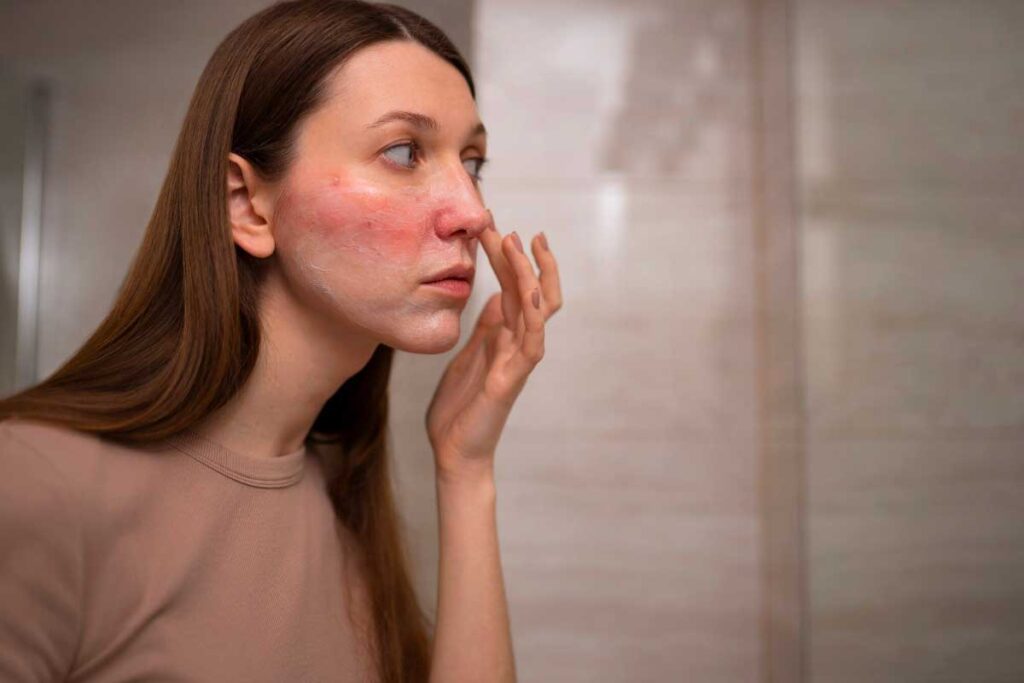Skin redness is a common concern for many individuals, and it can be caused by various factors, making some people more prone to it than others. Whether you’re dealing with occasional redness or a persistent issue, understanding the underlying reasons behind it can help you manage and prevent future flare-ups. In this article, we’ll delve into the world of skin redness, exploring the factors that contribute to its prevalence and how you can take better care of your skin.
The Basics of Skin Redness
Before we dive into the factors that make some skin more prone to redness, let’s start with the basics. Skin redness, also known as erythema, is a common skin concern characterized by the appearance of red patches or a flushed complexion. It can occur for various reasons, including:
Inflammation: Skin redness often results from inflammation. When your skin reacts to irritants, allergens, or other triggers, blood vessels dilate, causing the skin to turn red.
Skin Sensitivity: The degree of skin sensitivity varies among individuals. Some people have skin that is naturally more sensitive and reactive, making them more susceptible to redness.
Skin Types and Sensitivity
Understanding your skin type is essential in grasping why some individuals are more prone to redness. Skin types can be broadly categorized as sensitive, normal, dry, and oily. People with sensitive skin are particularly susceptible to redness due to their skin’s lower tolerance for irritants.
Sensitive skin is often characterized by:
- Easily triggered redness, even with minor irritants.
- A tendency to develop rashes or hives in response to allergens.
- A delicate skin barrier, which can lead to increased water loss and susceptibility to environmental factors.
Factors Contributing to Skin Redness
- Genetics: Your genetic makeup plays a role in determining your skin’s sensitivity. If your parents or close relatives have a history of sensitive skin or conditions like rosacea, you may be more predisposed to skin redness.
- Environmental Factors: Where you live and the environmental conditions you’re exposed to can impact your skin’s sensitivity. Harsh climates, pollution, and excessive sun exposure can all contribute to skin redness.
- Skincare Products: Some skincare products, such as Skinceuticals, particularly those containing harsh chemicals or fragrances, can irritate the skin and lead to redness. People with sensitive skin should opt for gentle, hypoallergenic products.
- Allergies and Irritants: Allergens and irritants found in skincare products, cosmetics, or even your surroundings can trigger skin redness. Common culprits include certain preservatives, dyes, and fragrances.
Medical Conditions and Skin Redness
Certain medical conditions are associated with chronic skin redness, which may make individuals more prone to it:
Rosacea: Rosacea is a chronic skin condition that leads to persistent facial redness, visible blood vessels, and sometimes pimple-like bumps. While it’s more common in fair-skinned individuals, it can affect people of all skin types.
Eczema: Eczema, or atopic dermatitis, can cause redness and inflammation in various parts of the body. It often starts in childhood and may persist into adulthood.
Lifestyle Factors
Apart from genetic and environmental factors, your lifestyle choices can also influence skin redness:
- Diet: A diet rich in spicy foods, alcohol, and hot beverages can dilate blood vessels and exacerbate skin redness. On the other hand, consuming anti-inflammatory foods like fruits and vegetables may help reduce redness.
- Stress: High-stress levels can trigger skin reactions, including redness. Practicing stress-reduction techniques like yoga, meditation, or deep breathing can be beneficial for your skin.
- Sleep: Quality sleep is crucial for skin health. Lack of sleep can lead to increased inflammation and skin sensitivity, resulting in redness.
Tips for Reducing Skin Redness
If you’re prone to skin redness, there are steps you can take to manage it effectively:
Choose the Right Skincare Products: Opt for gentle, fragrance-free skincare products specifically formulated for sensitive skin.
Protect Your Skin: Use sunscreen daily to shield your skin from UV radiation, and wear protective clothing in harsh weather conditions.
Manage Stress: Incorporate stress-management techniques into your daily routine to reduce the likelihood of stress-induced redness.
Stay Hydrated: Proper hydration is essential for maintaining a healthy skin barrier. Drink enough water to keep your skin well moisturized.
Seeking Professional Help
If your skin redness is severe, persistent, or accompanied by other concerning symptoms, it’s essential to consult a dermatologist or skincare professional. They can diagnose any underlying conditions and recommend appropriate treatments or skincare routines tailored to your specific needs.
Conclusion
Skin redness can affect anyone, but some individuals are more prone to it due to factors like genetics, skin type, environmental influences, and lifestyle choices. Understanding these factors is the first step in managing and preventing skin redness effectively. By taking proper care of your skin and seeking professional guidance when needed, you can maintain a healthy and radiant complexion.
In conclusion, remember that everyone’s skin is unique, and what works for one person may not work for another. Pay attention to your skin’s needs and adjust your skincare routine accordingly. With the right care and knowledge, you can minimize skin redness and enjoy a more comfortable and confident complexion.
Iskra Banović is our seasoned Editor-in-Chief at Blufashion. She has been steering the website’s content and editorial direction since 2018. With a rich background in fashion design, Iskra’s expertise spans across fashion, interior design, beauty, lifestyle, travel, and culture.





